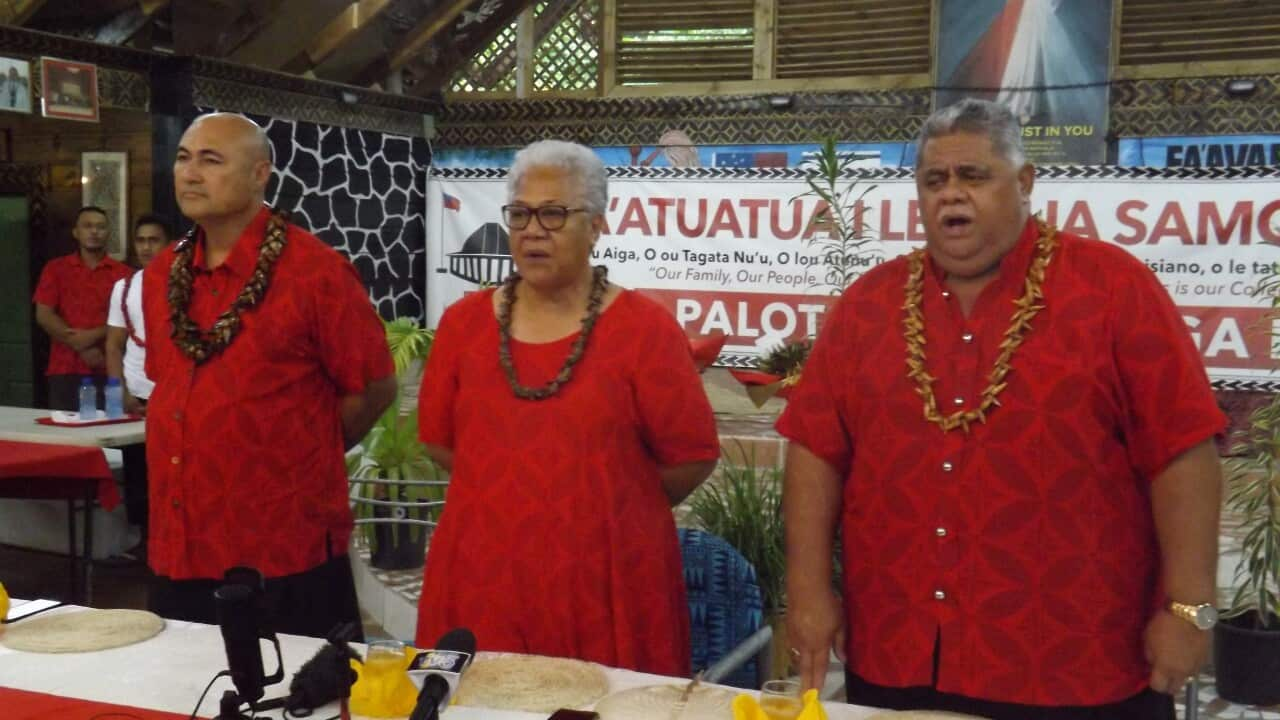HRPP has been in government for nearly 40 years, and the incumbent prime minister, Tuila'epa Sailele Malielegaoi, has been in office for more than 2 decades. The popularity and dominance of HRPP has seen them rule for decades without an acknowledged opposition in the parliament, and having the numbers to command a 2/3 majority to change or amend the Constitution.
The parliamentary term was extended from three to five years using this majority, and three bills on Land Registration, the Lands and Titles Court and matai (chiefly) titles, were pushed (rammed) through the parliament last year.
It was the three bills that caused a significant split in HRPP ranks when two of its former senior members left; one the former Speaker of parliament La'auli Polataivao Schmidt, and the other, former HRPP deputy leader and deputy prime minister Fiame Naomi Mata'afa.
Less than a year ago, La'auli sat on the opposite side as an independent, with the few non-HRPP MPs in the parliament, most notably Olo Fiti Va'ai, who has never joined HRPP, and Faumuina Wayne Fong, who had been in the HRPP caucus but had left some months before La'auli. Fiame Naomi joined them after she resigned her position as deputy prime minister and became an independent member, citing her protest against the three bills.
The political party, Fa'atuatua i le Atua Samoa ua Tasi (FAST) was mainly formed by La'auli Polataivao Schmidt and his supporters, with Olo Fiti Va'ai and Faumuina Wayne Fong. Fiame joined them and was chosen leader when parliament was dissolved to start campaigning for the 9 April elections. It is interesting to note the references to God in the name of the new political party - it means Faith in God, a United Samoa. More than 90% of comments by FAST supporters on Facebook and other social media have Christian messages in them.
FAST took to the road during the months leading up to the election meeting Samoans in villages and districts around the country. Its message obviously struck a chord with locals, especially young people between the ages of 21 and 25 who had never experienced any other government beside HRPP.
The 9 April election saw HRPP and FAST tied at 25 seats, with an Independent winning a seat in the 51-seat parliament. The Independent member, Tuala Tevaga Ponifasio, would be denied his chance to be kingmaker, when the Office of the Electoral Commissioner made an announcement on Facebook that the HRPP had secured an extra seat under a provision that called for 10% of members to be women. The Commissioner had appointed a HRPP woman candidate who did not win in the election to make a 52nd member of the parliament, and this was later ratified by the Head of State.
Now with HRPP holding 26 seats, the Independent member, Tuala Ponifasio, chose to side with FAST creating the deadlock. The Head of State declared the result of the 9 April election null and void and called for fresh elections to be held on 21 May (next Friday)
When the Head of Sate made this declaration, FAST had already taken the matter to the Supreme Court challenging the decision of the Electoral Commissioner. The challenge now includes the powers of the Head of State and whether it was constitutional.
The Supreme Court yesterday (17 May) handed down its ruling declaring the election of the extra HRPP member chosen by the Electoral Commissioner to be illegal, and that the result of the 9 April election is valid and still stands.
It means that the parliament is now back to 51 seats with FAST still having 26 seats and HRPP with 25.
HRPP leader and caretaker prime minister Tuila'epa Sailele Malielegaoi is talking about an appeal.
If the result stands, Fiame Naomi Mata'afa, will become Samoa's first woman prime minister. Her father, the late Faumuina Fiame Mata'afa Mulinu'u II, was the first prime minister of the independent state of Samoa.
As a footnote: There are more than 20 petitions arising from the 9 April election; these are mainly based on accusations of electoral fraud and bribery. The result of these petitions will determine whether or not FAST retains power for the rest of the 5-year term.

